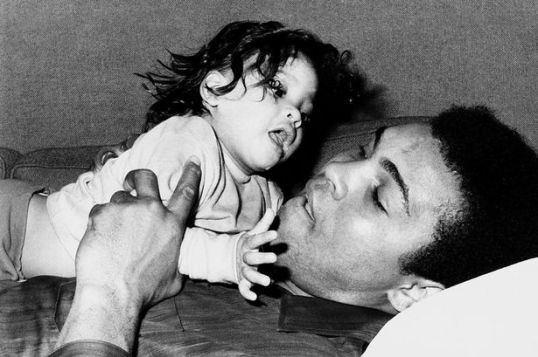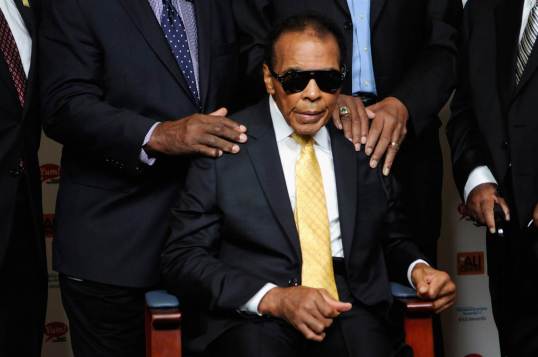Muhammed “Rebel” Ali Leaves The Ring
“If you even dream of beating me you’d better wake up and apologize.”

The world, today, pays tribute to a man who, beyond being one of the greatest boxers and showmen of all times.. a man who brought the sport out of the dingy gyms and into the living rooms of millions.. was uniquely individual in standing up for himself and for his convictions, the oppressed and downtrodden, family and faith, love and compassion, for right and for rights and for the raising up of the human spirit through every thing he did and tried to do throughout his life.
Muhammed Ali was a cocky young man who conquered the world of Boxing by the age of 22. He began his career training from age 12. A vision and focus that was to propel him to become the World Heavyweight Champion against the formidable Sonny Liston in 1964. Ali became, at that time, the youngest Boxer to ever take that title from a reigning heavyweight champion. Floyd Patterson attained the title at age 21, however, the champ, Rocky Marciano, had already retired. Years later, Mike Tyson would take the tile at age 20.
Ali did not become Muhammed Ali until a few days after this epic bout. He was born, and initially boxed under, Cassius Marcellus Clay, Jr. He and his younger brother, Rudy, were attracted to the “Black Muslims” when Ali was about age 18, much to the dissatisfaction of his father, Cassius Sr. Ali began studying Islam and became a faithful Muslim taking, initially, the name Cassius X (The name, Clay, being considered a “slave name”) before formally announcing his membership with the Nation of Islam and his new name, Muhammed Ali.
I recall the excitement of that 1964 bout with Liston and how Ali instantly came to fame. Prior to this bout, he had some less than spectacular fights and controversial decisions. He was heavily defined as the underdog, both by media and the bookies, going into his bout with Liston. The cockiness he displayed prior would soon come to be a signature attraction where it was once the focus of disdain.
"Clay comes out to meet Liston and Liston starts to retreat, If Liston goes back an inch farther he'll end up in a ringside seat. Clay swings with a left, Clay swings with a right, Just look at young Cassius carry the fight. Liston keeps backing but there's not enough room, It's a matter of time until Clay lowers the boom. Then Clay lands with a right, what a beautiful swing, And the punch raised the bear clear out of the ring. Liston still rising and the ref wears a frown, But he can't start counting until Sonny comes down. Now Liston disappears from view, the crowd is getting frantic But our radar stations have picked him up somewhere over the Atlantic. Who on Earth thought, when they came to the fight, That they would witness the launching of a human satellite. Hence the crowd did not dream, when they laid down their money, That they would see a total eclipse of Sonny."
It had only been a few months earlier, in late November, when the world was struck by the assassination of President Kennedy. The depression which had settled upon so many after that moment in time began to lift somewhat as a nation turned its gaze toward the rise of Muhammed Ali. His youth and vitality, his passion and flare and even his cocky humour had an effect which brought hope out from hiding. At least, for some of us.
“People don’t realize what they had till it’s gone. Like President Kennedy, there was no one like him, the Beatles, and my man Elvis Presley. I was the Elvis of boxing.”
It was a time of great frustration and anger over racial divides in the US. A mere 18 months post the Ali triumph, the US would see the devastation from the Watts Riots. For Ali, the realization of how quickly tides can turn came with the threats to cancel the boxing match because of Ali’s association with Malcolm X and affiliation with the Nation of Islam (Malcolm had been removed from the Nation at that time but was Ali’s chosen spiritual advisor. Malcolm agreed to distance himself from pre-publicity events but not the actual match.) … and then a few days post with announcement of his name change. The media were rabid in their attacks against the Nation, and against Ali. The level of vitriol from supremacists and a growing cadre of ignorant young followers was deafening. Ali, steadfast in the awareness of who he was and was becoming, used humour, wisdom and faith to respond. Without regard for the type of publicity it would bring, he responded to reporters with brashness and mocking humour, often catching them off guard, exposing their racism, and generally showing them up to be the fools that they were. Martin Luther King Jr. , displaying his own bias and misunderstanding, chastised Ali for his association with Malcolm and with the NOI, calling him the “champion of racial segregation”.
“I know where I’m going and I know the truth, and I don’t have to be what you want me to be. I’m free to be what I want.”
Three years later, in 1967, Ali would again stand up for himself and his beliefs.. and at great cost to his career. Faced with the draft, Ali announced that he would refuse conscription as a conscientious objector to the illegal and racist war in Vietnam. Cheered on by those of us who, by that time, had begun our “radicalism” and joined anti-war movements.. and jeered by those who thought “patriotism” meant running off to kill people (who never harmed, nor intended harm to, any American) just because the government said so. Ali would be arrested, charged with evasion and stripped of his rightfully earned title. His appeals traveled all the way to the Supreme Court where his conviction was, in 1971, overturned. Still, the media attacked him and he was shunned by many opportunities which otherwise would have presented. He lost nearly four prime years of his career as a boxer yet remained focused and determined: enough that he would go on to win the title a second time in 1974 and again for an unprecedented 3rd time in 1978.
The road to return was not without more difficulties for Ali who remained in control of himself and his future in his chosen career. Claims of mob involvement in fixing fights and investigations by FBI and Senate committees as well having a ban placed on his boxing by one of two boxing commissions and the refusal of venues based either upon his association with NOI or his conscription refusal did not stop Ali. He came out on top again and again and showed the world that they could not beat him.
“If you even dream of beating me you’d better wake up and apologize.”
After a falling out with the NOI which was experiencing considerable inner turmoil, Ali converted to Sunni Muslim practice and took a break from boxing. Later, in 2005, Ali would begin practice in Sufism. It was 1975 and Ali had recently gone through a string of matches where he took considerable punches and a number of troubling injuries. Ali would come back again to win his 3rd crown but his health was showing signs of deterioration. His kidneys were damaged, gate and voice had begun to falter and a tremor had begun to show in his hands. He resisted calls to retire, loosing a manager in the process but announced retirement in 1997. It was short lived and he fought again in 1980 against Larry Holmes. The fight was stopped in the 11th round. Ali did not win. He fought one more time approximately a year later in a 10 round decision to Trevor Berbick.
Ali continued to remain active and outspoken. In 1984, he was diagnosed with Parkinson’s Disease, said to have been caused by the many head punches he had taken over the years.Undaunted, he would become an ambassador, of sorts, traveling to Iraq, where he attempted to negotiate the release of prisoners in a meeting with Saddam Hussein, and Afghanistan among other countries and regions. He lit the torch for the 1996 Summer Olympics and was the flag bearer in the 2012 opening ceremony for the Summer Olympics. He would go on to meet and greet dignitaries from around the globe representing peace and human rights.
Some may recall an earlier “retirement” in 1974 when Ali traveled to the Middle East. Ever outspoken, Ali would, while in Beirut, proclaim, “the United States is the stronghold of Zionism and imperialism.” Visiting two Palestinian refugee camps in Lebanon, Ali would announce, “In my name and the name of all Muslims in America, I declare support for the Palestinian struggle to liberate their homeland and oust the Zionist invaders.
”Showing the ultimate in rebel spirit, in 1985, Ali traveled to Israel in an attempt to gain freedom for 100’s of Lebanese and Palestinians captured during the occupation of a portion of Lebanon.
“I’ve made my share of mistakes along the way, but if I have changed even one life for the better, I haven’t lived in vain.”
Today, people in Palestine and throughout the Middle East are expressing their celebration of the life and works of Muhammed Ali… and mourning his passing.

Muhammed Ali… “The Greatest” …January 17, 1942 – June 3, 2016

Reblogged this on The Militant Negro™.
LikeLike
Reblogged this on Uprootedpalestinians's Blog.
LikeLike